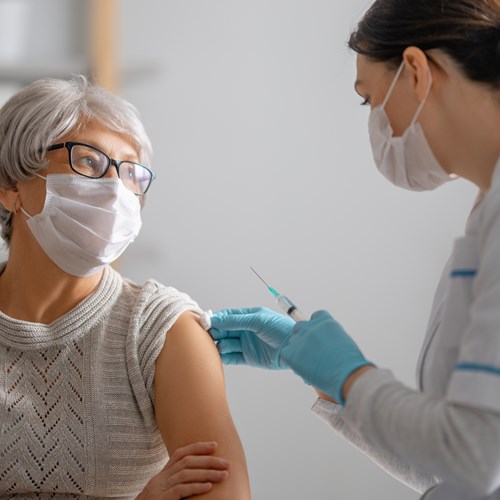COVID-19 vaccines – what you need to know
18 February 2021
Our guide will help businesses ensure their staff can find accurate and timely information on COVID-19 vaccines.
This page was updated on 4 March 2022.
Following the authorisation of the first COVID-19 vaccine in December 2020, the government launched the UK’s COVID-19 vaccination programme. As the vaccination landscape continuously evolves, it is important to be able to access the latest information from reliable sources.
To help businesses ensure their employees are well informed we have created this quick-read guide with key information relating to the COVID-19 vaccines and a series of frequently asked questions.
Employers can also refer to the government's guide for more information on what to do to support the vaccination of their workforce.
Where can I get the vaccine?
You can book your COVID-19 vaccination appointments online on the NHS website or visit one of the walk-in vaccination sites that have opened.
You can find more information on the Greater Manchester walk-in clinics through the links below.
| Bolton | Vaccination sites |
| Bury | Walk-in clinics |
| Manchester | Pop up vaccination clinics |
| Oldham | Local vaccination clinics |
| Rochdale | Local vaccine clinics |
| Salford | Walk-in vaccination clinics |
| Stockport | Vaccination pop up locations |
| Tameside | Vaccination clinics |
| Trafford | Drop-in Covid-19 vaccination clinics |
| Wigan | Walk-in vaccine clinics |
Authorised COVID-19 vaccines
In the UK, there are currently four approved COVID-19 vaccines with three of them in distribution.
| Vaccine | What age group is the vaccine approved for? | Dosage | In distribution |
| Pfizer/BioNTech vaccine | authorised for those aged 5 and over | 2 doses required | Yes |
| Vaxzevria (formerly COVID-19 vaccine Oxford/AstraZeneca) | authorised for those aged 18 and over | 2 doses required | Yes |
| Spikevax vaccine (formerly COVID-19 Vaccine Moderna) | authorised for those aged 6 and over | 2 doses required | Yes |
| Janssen vaccine | authorised for those aged 18 and over | Single-dose | No |
All adults are eligible to get their second dose after eight weeks. Individuals with severely weakened immune systems are also being offered a third dose as part of their primary COVID-19 vaccination schedule to help improve any protection they may have built from the first 2 doses.
This is different to the booster programme whose purpose is to help extend the protection provided by the vaccines. Boosters are offered to eligible individuals 3 months after their second dose.
On 21 February 2022, the Joint Committee on Vaccination and Immunisation (JCVI) advised that an additional spring booster dose should be offered to people aged 75 years and over, residents in care homes for older adults, and people aged 12 years and over who are immunosuppressed around 6 months after their last vaccine dose.
All four vaccines have been shown to be effective in clinical trials and have a good safety record. The real-world efficacy of the COVID-19 vaccines is also being monitored by Public Health England.
*Guidance has been published for children and young people aged 12 to 17 eligible to receive the vaccine. On 16 February 2022, the JCVI also issued new guidance for 5 to 11-year-olds. Children in this age group should be offered two doses of the Pfizer-BioNTech paediatric vaccine.
Ensure your staff have access to information from credible sources and help prevent the spread of false information
The government has launched the SHARE checklist to help prevent the spread of false information relating to coronavirus and vaccinations. This tool can help colleagues know what to look out for before they like, comment or share information they come across online.
The latest information relating to the COVID-19 vaccines is available on the UK Government’s website and the NHS website.
Employers can also use Public Health England's toolkit to run an internal awareness campaign to help ensure their employees get access to reliable and accurate information about the vaccines.
Additional Resources
 Spring booster resources
Spring booster resources
Information on the spring booster dose for eligible individuals.
Read more COVID-19 vaccination: guide for adults
COVID-19 vaccination: guide for adults
Information for eligible adults on COVID-19 vaccination.
Read more Guide for women
Guide for women
Information for all women of childbearing age, those currently pregnant or breastfeeding on vaccination.
Read more What to expect after vaccination
What to expect after vaccination
Information for people who have had their first COVID-19 vaccination.
Read moreRaise awareness of vaccine fraud
Throughout the pandemic, there has been a noticeable rise in fraud and cybercrime. There have been reports of scammers taking advantage of the roll-out of the COVID-19 vaccine to access financial details and steal money.
Other COVID-19 scams include websites and social media accounts selling medical products claiming to treat or prevent COVID-19, fraudulent government websites and HMRC related phishing emails, suspicious phone calls and texts.
To help ensure your employees know what to look out for, we have created a Cyber-crime awareness guide with a series of useful tools and resources.
COVID-19 Vaccine FAQs
Is the vaccine safe?
How was the vaccine created so quickly?
Does the vaccine have any side effects?
Do the vaccines contain animal products?
Can people with allergies get the vaccine?
Can pregnant women get the vaccine?
Does the vaccine affect fertility?
Latest news
- Use of the Moderna COVID-19 vaccine or ‘Spikevax’ has been approved for 6 to 11s after meeting the required safety, quality and effectiveness standards. View here (14 April)
- The latest UK Health Security Agency (UKHSA) data shows that 53.7% of pregnant women in England have been vaccinated with at least one dose of coronavirus (COVID-19) vaccine. View here (25 March)
- The Joint Committee on Vaccination and Immunisation (JCVI) has advised an additional spring booster dose for the most vulnerable individuals in the population. View here (21 February)
- Latest findings from the SIREN study reinforce the efficacy of COVID-19 vaccines. View here (17 February)
- The Joint Committee on Vaccination and Immunisation (JCVI) has advised a non-urgent offer to all 5 to 11 year olds of 2 (10mcg) doses of the Pfizer-BioNTech paediatric vaccine with a view to increase protection against potential future waves of coronavirus (COVID-19). View here (16 February)
- The government intends to revoke the regulations making vaccination a condition of deployment in all health and social care settings and has published a consultation seeking views on revoking these. View here (9th February)
- The latest data from the UK Health Security Agency (UKHSA) shows that boosters significantly reduce the risk of death with Omicron. View here (27 January).
- Latest data reinforces the safety of COVID-19 vaccinations in pregnant women. View here (27 January)
- Children aged 5 to 11, who are in a clinical risk group or who are a household contact of someone (of any age) who is immunosuppressed, should be offered a primary course of vaccination. View here (23 December)
- A new paediatric formulation of the Pfizer BioNTech COVID-19 vaccine has been approved by the Medicines and Healthcare products Regulatory Agency (MHRA) for children aged 5 to 11 after meeting the required safety, quality and effectiveness standards. View here (22 December)
-
Data from UKOSS and MBRRACE-UK has revealed that clinical outcomes following COVID-19 in pregnant women have worsened over the course of the pandemic. The UKOSS study also found that the vast majority of pregnant women who were admitted to hospital with COVID-19 were unvaccinated. Following the release of this information, the Joint Committee on Vaccination and Immunisation (JCVI) is calling on all pregnant women to get vaccinated as soon as possible. View here (16th December)
- 15-minute observation period after the vaccine has been temporarily suspended to speed up booster rollout. View here (14th December)
- Powerful new video shows the experiences of unvaccinated mothers with severe COVID-19 during pregnancy. View here (4th December).
- Government agrees new deals to future proof vaccine rollout in light of new variant. View here (2nd December).
- All adults to be offered COVID-19 boosters by end of January. View here (30th November).
- Advice from the Joint Committee on Vaccination and Immunisation (JCVI) in response to the emergence of the Omicron variant. View here (29th November).
- Guidance on myocarditis and pericarditis after COVID-19 vaccination has been published for healthcare professionals. View here (29th November)
- New UKHSA study provides more safety data on COVID-19 vaccines in pregnancy. View here (25th November)
- JCVI issues advice on COVID-19 booster vaccines for those aged 40 to 49 and second doses for 16 to 17 year olds. View here (15th November)
- Results from first UK real-world study by UKHSA show significantly increased protection against symptomatic disease from Pfizer-BioNTech vaccine booster dose in those aged 50 and above. View here (15th November).
- Key Update: Government to introduce COVID-19 vaccination as a condition of deployment for all frontline health and social care workers. View here (9th November)
- From Monday 8 November 2021, the National Booking System will allow someone to pre-book their COVID-19 booster appointment a month before they are eligible. View here (6th November)
- Clinical guidance has been updated to allow COVID-19 boosters to be given earlier to those at highest risk where this makes operational sense. View here (29th October).
- Most vulnerable to be offered COVID-19 booster vaccines from next week. View here (14th September)
- JCVI has advised that for the 2021 COVID-19 booster vaccine programme individuals who received vaccination in Phase 1 of the COVID-19 vaccination programme (priority groups 1 to 9) should be offered a third dose COVID-19 booster vaccine. View here (14th September)
- Following advice from the four UK Chief Medical Officers (CMOs), people aged 12 to 15 in England will be offered one dose of the Pfizer/BioNTech COVID-19 vaccine. View here (13th September)
- MHRA has confirmed that the COVID-19 vaccines made by Pfizer and AstraZeneca can be used as safe and effective booster doses. However, JVCI will be advising on whether booster jabs will be given and if so, which vaccines should be used. View here (9th September).
- A letter from the health ministers of the 4 UK nations asking the UK's chief medical officers to advise on the vaccination of young people aged 12 to 15 has been published. View here (3rd September).
- The JCVI is advising that people with severely weakened immune systems should have a third vaccine dose as part of their primary COVID-19 vaccination schedule. View here (1st September).
- An extension to the current UK approval of the Spikevax vaccine (formerly COVID-19 Vaccine Moderna) that allows its use in 12- to 17-year-olds has today been authorised by the Medicines and Healthcare products Regulatory Agency (MHRA). View here (17th August).
- 7 in 10 young people aged 18-29 have now been vaccinated with a first dose. View here (12th August).
- Latest data shows 60,000 deaths and 66,900 hospitalisations have been prevented by the vaccines. View here (10th August).
- Key Update: From 11 November 2021, anyone working or volunteering in a care home will need to be fully vaccinated against coronavirus (COVID-19), unless exempt. View the operational guidance for the vaccination of people working or deployed in care homes here (4th August).
- The Joint Committee on Vaccination and Immunisation (JCVI) is today advising that all 16 and 17-year-olds should be offered a first dose of the Pfizer-BioNTech vaccine. View here (4th August).
- Findings from the latest report of REACT-1, one of the country’s largest studies into COVID-19 infections in England, show COVID-19 infection rates are three times lower for double vaccinated people. View here (4th August).
- New government-funded clinical trial investigating best COVID-19 vaccine dose interval for pregnant women launched in England. View here (3rd August).
- Over 88% of adults have had a first dose and over 72% of adults have had both doses. View here (1st August).
- Health chiefs are encouraging more pregnant women to get their COVID-19 vaccine, as new data shows that 51,724 pregnant women in England have received at least one dose. View here (22nd July).
- Key Update: The government plans to make full vaccination a condition of entry to nightclubs and other venues where large crowds gather by the end of September when everyone aged 18 and over will have had the chance to receive full vaccination View here (19th July).
- Statement from the Joint Committee on Vaccination and Immunisation (JCVI) on COVID-19 vaccination of children and young people aged 12 to 17 years. View here (19th July).
- Both first and second dose vaccine targets for 19 July were hit ahead of schedule. View here (19th July).
- Data highlights the importance of getting both doses for the best possible protection as almost 100% of people have antibodies after the second vaccine. View here (15th July).
- More than two in three adults have received both doses of vaccine. View here (14th July).
- Over half (54%) of young people aged 18 to 24 in England have received a first dose - just three weeks after the programme was opened to this age group. View here (9th July).
- A study from Public Health England (PHE), which included more than 1 million people in at-risk groups found that COVID-19 vaccines are highly effective in clinical risk groups. View here (9th July).
- Interim findings from one of the country’s largest studies into COVID-19 infections in England show COVID-19 infection rates are three times lower for double vaccinated people. View here (8th July).
- The Joint Committee on Vaccination and Immunisation (JCVI) has been asked to consider the options for a potential coronavirus (COVID-19) booster programme. View here (1st July)
- New analysis suggests the vaccination programme has prevented between 6.4 and 7.9 million infections and 26,000 and 28,000 deaths in England alone. View here (28th June).
- A new leaflet has been published for people eligible for COVID-19 vaccination who have had their first dose of AstraZeneca vaccine and have concerns about having the second dose. View here (28th June).
- Over 60% of UK adults (3 in 5) have been vaccinated with a second dose of the coronavirus (COVID-19) vaccine, giving them the fullest possible protection. View here (23rd June).
- 4 in 5 adults have now received a first dose of coronavirus (COVID-19) vaccine. View here (18th June).
- Second dose brought forward to 8 weeks for over 40s to provide strongest protection against Delta variant sooner. View here (14th June).
- New analysis by PHE shows for the first time that 2 doses of COVID-19 vaccines are highly effective against hospitalisation from the Delta (B.1.61.2) variant. View here (14th June).
- More than 55.4% of people in the UK have been vaccinated with both doses for the fullest possible protection. View here (11th June).
- Over 40 million people receive first dose of COVID-19 vaccine in UK. View here (8th June).
- The MHRA concludes positive safety profile for Pfizer/BioNTech vaccine in 12- to 15-year-olds. View here (4th June).
- Over half of UK adults vaccinated with second dose. View here (3rd June)
- Three quarters of UK adults vaccinated with first dose. View here (2nd June).
- The Medicines and Healthcare products Regulatory Agency (MHRA) has today approved the single-dose Janssen COVID-19 vaccine for use in the UK and doses are expected to be available from later this year. View here (28th May).
- Around 72% of UK adults have received a first dose of a COVID-19 vaccine. View here (23rd May).
- A new study by PHE shows for the first time that 2 doses of the COVID-19 vaccines are highly effective against the B.1.617.2 variant first identified in India. View here (22nd May).
- New storage conditions for the Pfizer/BioNTech COVID-19 vaccine, that extend the length of time the thawed vaccine can be stored at normal fridge temperatures from 5 days to 31 days, have today been approved by the Medicines and Healthcare products Regulatory Agency (MHRA). View here (20th May).
- New government-funded clinical trial looking at different COVID-19 ‘booster’ vaccines launches in the UK. View here (19th May).
- 7 in 10 UK adults receive first dose of coronavirus (COVID-19) vaccine. View here (19th May).
- The first COVID-19 vaccine study in the UK to recruit pregnant women has been launched across eleven National Institute of Health Research sites. View here (17th May).
- Appointments for a second dose of a vaccine will be brought forward from 12 to 8 weeks for the remaining people in the top 9 priority groups who have yet to receive their second dose. View here (14th May).
- Coronavirus (COVID-19) vaccines have now prevented 33,000 hospitalisations and 11,700 deaths in older adults. View here. (14th May).
- New evidence continues to show vaccination is highly effective in protecting against death and hospitalisation from coronavirus (COVID-19). View here (10th May)
- The government has published a statement following updated advice from the Joint Committee on Vaccination and Immunisation (JCVI) on the use of the coronavirus (COVID-19) Oxford/AstraZeneca vaccine for people aged under 40. View here (7th May)
- An extra 60 million doses of the Pfizer/BioNTech vaccine have been secured by the UK government to help support the booster COVID-19 vaccination programme beginning from the Autumn. View here (28th April).
- A new study by Public Health England (PHE) has shown that one dose of the COVID-19 vaccine reduces household transmission by up to half. View here (28th April).
- JCVI issues new advice on COVID-19 vaccination for pregnant women. View here (16th April).
- The Joint Committee on Vaccination and Immunisation (JCVI) has published its final statement on phase 2 of the COVID-19 vaccination programme. View here (13th April).
- The national protocol for the COVID-19 Vaccine Moderna has been published. View here (8th April).
- The government has published information and guidance on a very rare condition involving blood clots and unusual bleeding after COVID-19 vaccination. View here (7th April).
- Government statement on AstraZeneca Covid-19 vaccine following MHRA update. View here (7th April).
- MHRA issues new advice, concluding a possible link between COVID-19 Vaccine AstraZeneca and extremely rare, unlikely to occur blood clots. View here (7th April).
- Statement from the Joint Committee on Vaccination and Immunisation (JCVI) following reports of an extremely rare adverse event after vaccination with the first dose of the AstraZeneca COVID-19 vaccine. View here (7th April).
- New vaccine advice for adults living with adults who are immunosuppressed has been published. View here (29th March).
- Study led by Sheffield and Oxford Universities finds that 99% of people have robust immune response against COVID-19 after one dose of Pfizer vaccine. View here (26th March)
- UK regulator confirms that people should continue to receive the COVID-19 vaccine AstraZeneca. View here (18th March)
- Data on the real-world efficacy of the COVID-19 vaccines, March 2021. View here (17th March)
- PHE study shows three-quarters of over 70s have COVID-19 antibodies. View here (18th March).
- MHRA response to the precautionary suspensions of COVID-19 Vaccine AstraZeneca. View here (14th March)
- JCVI advises prioritising homeless people and rough sleepers for COVID-19 vaccine. View here (11th March)
- Modified COVID-19 vaccines for variants to be fast-tracked, says MHRA and other regulators. View here (4th March).
- New data show vaccines reduce severe COVID-19 in older adults. View here (1 March)
- Advice on phase 2 of the COVID-19 vaccination programme: DHSC statement. View here (26 February)
- First real-world UK data shows Pfizer-BioNTech vaccine provides high levels of protection from the first dose. View here (22 February)
- Published the Public Assessment Report for Moderna COVID-19 vaccine. View here (19th February)
More information is available on the UK Government’s Coronavirus Business Support website. For more personalised advice call us on: 0161 359 3050 or email us at: BGH@growthco.uk
The information provided is meant as a general guide only rather than advice or assurance. GC Business Growth Hub does not guarantee the accuracy or completeness of this information and professional guidance should be sought on all aspects of business planning and responses to the coronavirus. Use of this guide and toolkit are entirely at the risk of the user. Any hyperlinks from this document are to external resources not connected to the GC Business Growth Hub and The Growth Company is not responsible for the content within any hyperlinked site.